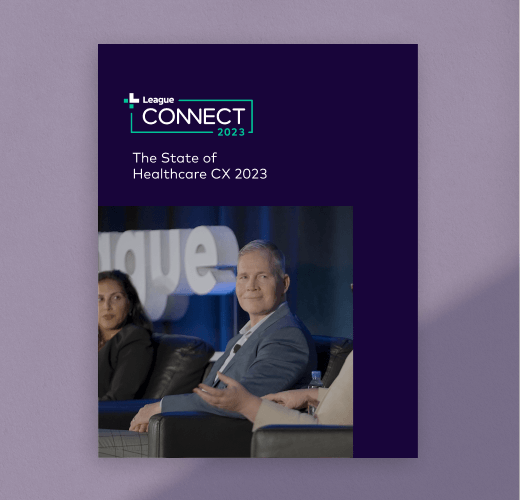Summary
- Healthcare organizations aim to consolidate data for personalized, scalable experiences to achieve business goals.
- Partnering with a payer member experience software provider allows health organizations to scale faster, innovate more effectively, and reduce risk.
- The future of digital platform healthcare will be defined by seamless integration, collaborative ecosystems, and rapid innovation cycles. Within a decade, expect deeply integrated, personalized healthcare apps, with AI/ML transforming predictive capabilities for better health outcomes.
Andy Harlen has years of experience scaling software-as-a-service (SaaS) based companies throughout the financial, insurance and health tech industries. During his career, Harlen has both witnessed and played a critical role in the ongoing evolution of partnerships in healthcare — away from straight technology purchases and into strategic collaborations with shared investment, risk, accelerated time-to-value and ecosystems that support innovation.
In this installment of our new Thought Leaders @ League series, Harlen discusses how strategic partnerships enable health plans and health systems to innovate and scale consumer experiences, why digital transformation is more than just a migration to new technologies and how he envisions partnerships evolving in the next five and 10 years.

We will see massive innovation occur with hyper-scalers, marketplaces and partnerships. These collaborative environments will be the new model where rapid app innovation happens.
Andy Harlen
Head of Platform Partnerships, League
Q: How has the nature of the age-old build vs. buy vs. partner technology decision evolved in healthcare during the past few years?
A: To answer that question, I think it’s helpful to first think about the end goal that healthcare organizations want. Effectively, what they want is to consolidate all data from their backend systems and then marry that with information from the end user to create true longitudinal records. Longitudinal records allow for true data liquidity and enables organizations to drive true personalization at scale and offer healthcare experiences that rival anything from the consumer sector. That will enable healthcare organizations to drive high value business objectives, close care gaps, identify barriers to care and address health equity.
In healthcare, building often means doing it alone, and this is an especially monumental task when developing a sophisticated consumer experience (CX) engine. When it comes to the build versus buy debate, there’s actually a third option and that’s build by partner. Essentially, you buy a platform to build your unique experience. That also provides you with a partner who leverages CX expertise to drive best-in-class engagement with your users.
With this strategy, you are getting the best of all those build versus buy scenarios. When you partner with enterprise organizations, especially with platforms, you get economies of scale and position your organization for years of continuous development and improvements. Over the past few years, organizations from large to small are realizing that platform partners are providing tremendous horizontal value, which enables them to compress product roadmaps and focus on innovation instead of just keeping the lights on with a product.
Q: Given the growing need for healthcare’s payers, providers and retail pharmacies to align in strategic collaborations and transform CX, how should executives be thinking about building an ecosystem of partners?
A: All these organizations realize they aren’t just competing against other healthcare companies, they are now competing against everyone else for attention, for their time on cell phones, apps and digital health tools. Executives need to understand that if their tech stack doesn’t enable the best digital experience, then they are going to lose to an organization that is investing in digital CX transformation.
When it comes to the digital front end, the world doesn’t need more link farms, we need truly integrated digital health experiences. We need an infrastructure that enables hyper-personalization that is entirely cohesive, and industry-leading executives understand they can leverage that platform infrastructure to drive consumer engagement with their unique brand identity.
Q: What is your best advice for health plan and health system executives evaluating whether a potential partner is legitimate or a so-called ‘vendor pretender?’
A: The first thing to do is ensure that any potential partner has a sound digital strategy to engage users. This means driving personalized health experiences broadly across the ecosystem, not just within a single tactical use case. I would then suggest digging deep into strategic planning where the company focuses on, say, app consolidation and rationalization exercises. As business leaders build a digital transformation strategy, they need to closely examine their tech stack and ask themselves thoughtful questions about whether the vendors they are working with are actually helping them engage end users or offering solutions that do not. Furthermore, determine whether their ecosystem of vendors offers integrations that enhance experiences, rather than moving users to siloed experiences.
Having a highly engaging and differentiated digital experience is no longer optional, it’s table stakes. The purpose of all of this is to build a technology strategy that leans on organizations that truly show up as a partner to drive innovation and not just sell you a license and say “good luck, see you at contract renewal.”
Q: The nature of partnerships is evolving away from the ‘see you at contract renewal’ mindset. What’s your prediction for how strategic healthcare partnerships will look in five years? In 10?
A: I think in the near future we are going to clearly define what is ‘best-in-class’ across all of the healthcare verticals. When this occurs, payers, providers and retail pharmacies will productize their differentiators (strategy, tech stack, IP) and make these products available for other organizations to use.
The legacy of older point solutions will either rapidly evolve or give way to more nimble and integrated applications that don’t have hefty prices due to an enormous amount of technical debt, which means customers won’t be on the hook for long periods of innovation as they traditionally have been. We will see massive amounts of innovation occur with hyper-scalers, marketplaces and deep strategic partnerships. These collaborative environments will be the new model of innovation where rapid app innovation happens.
In 10 years, I believe we’ll see a complete ubiquity of digital health technology and almost all healthcare stakeholders will seamlessly collaborate on deeply connected products through platform ecosystems. Healthcare will be integrated beyond just data sets, meaning apps will become personalized and actionable in your daily life. You will be able to manage your health and healthcare through these apps, and everything will be perfectly integrated and synced.
I think I’m most excited about advancements occurring in AI and ML. Organizations will have the ability to predict healthcare events with incredible accuracy to get ahead of healthcare issues like never before — completely changing not just health outcomes but the entirety of healthcare economics.

State of Healthcare CX 2023
Read top takeaways and key insights from healthcare’s premier CX transformation event.
